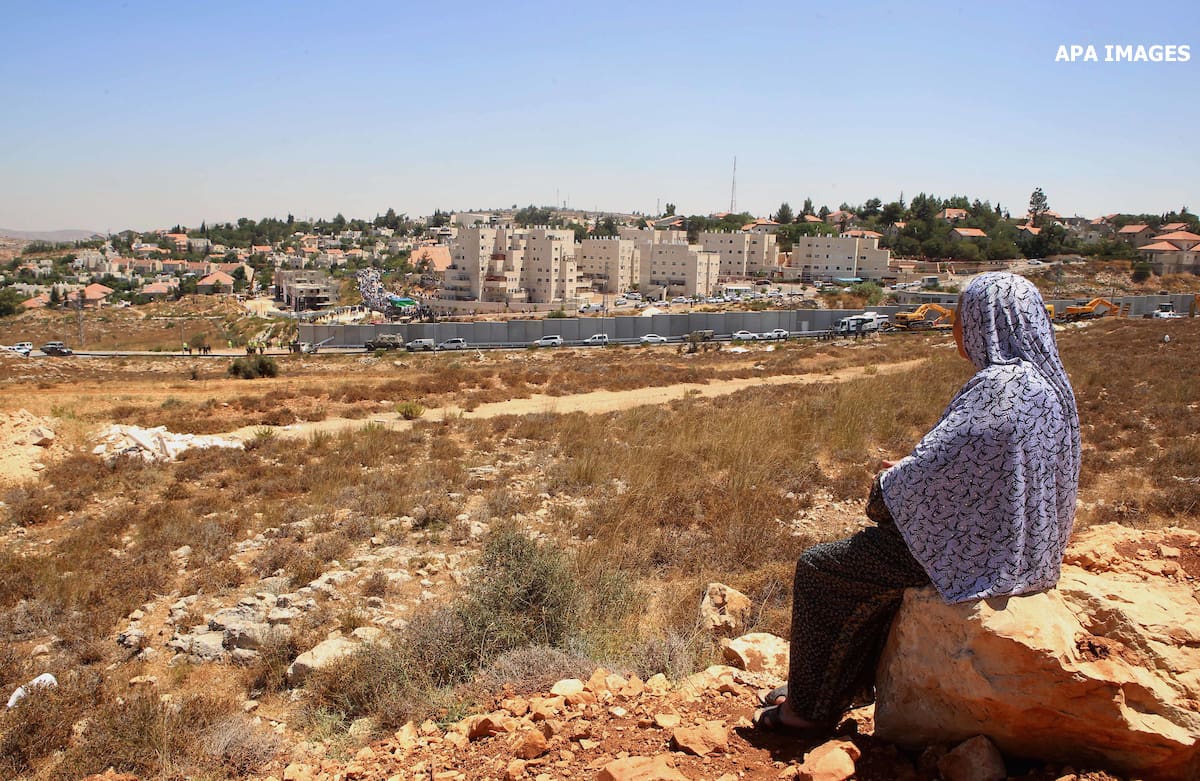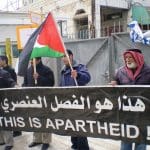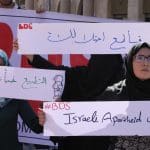
Executive Summary
As Israel intensifies its settler-colonial project, apartheid has become an increasingly important framework for understanding and challenging Israeli rule in historic Palestine. Under international law, apartheid is a crime against humanity and states can be held accountable for their actions. However, international law has its limitations. To bring about true justice and equality for Palestinians, apartheid must be recognized as a system not only of legal racial discrimination, but also of racial capitalism.
- By focusing only on the political regime, the definition of apartheid under international law does not provide a strong basis for critiquing the economic aspects of apartheid and paves the way for a post-apartheid future that is rife with economic discrimination.
- During the 1970s and 80s, Black South Africans debated how to understand the apartheid system they were fighting. The African National Congress and its allies argued that apartheid was a system of racial domination and that the struggle should focus on eliminating racist policies and demanding equality under the law. Black radicals rejected this analysis, generating an alternative definition of apartheid as a system of “racial capitalism.”
- In 1994, apartheid was abolished and Black South Africans gained equality under the law. However, the transition did not address the structures of racial capitalism. Neoliberal restructuring has led to the emergence of a small Black elite and a growing Black middle class. But the old white elite still controls the vast majority of land and wealth in South Africa. Post-apartheid South Africa is one of the most unequal countries in the world.
- Critiques of Israeli apartheid have largely ignored the limits of transformation in South Africa. Instead of treating apartheid as a system of racial capitalism, most rely on the international legal definition.
- All of historic Palestine remains subject to Israeli rule, which operates by fragmenting the Palestinian population. Neoliberal restructuring has enabled Israel to carry out its new colonial strategy by significantly reducing its reliance on Palestinian labor and to engineer the disposability of the Palestinian population.
- Since 2007, the Palestinian Authority (PA) has followed a strictly neoliberal economic program that calls for cuts to public employment and an expansion of private sector investment. Despite these plans, the private sector remains weak and fragmented.
Policy recommendations:
- Understand Israeli apartheid as a form of racial capitalism. This could enhance movements working together against global, neoliberal apartheid.
- Continue conversations about the practical dynamics of Palestinian return. This will draw attention not only to political rights but also to difficult questions about land redistribution and economic structure.
- Shift the political discourse in Palestine from independence to decolonization. This prevents a liberation movement that ends with an independent state governed by a nationalist elite that mimics the colonial power.
Overview
As Israel intensifies its settler-colonial project, apartheid has become an increasingly important framework for understanding and challenging Israeli rule in historic Palestine. Indeed, Nadia Hijab and Ingrid Jaradat Gassner make a convincing argument that apartheid is the most strategic framework of analysis. And in March 2017, the UN Economic and Social Commission for Western Asia (ESCWA) released a powerful report documenting Israeli violations of international law and concluding that Israel has established an “apartheid regime” that oppresses and dominates the Palestinian people as a whole.1
Under international law, apartheid is a crime against humanity and states can be held accountable for their actions. However, international law has its limitations. One specific concern involves what is missing from the international legal definition of apartheid. Because the definition focuses solely on the political regime, it does not provide a strong basis for critiquing the economic aspects of apartheid. To address this concern, we propose an alternative definition of apartheid that grew out of the struggle in South Africa during the 1980s and has gained support among activists due to the limits of decolonization in South Africa after 1994 – a definition that recognizes apartheid as intimately connected to capitalism.
This policy brief details what the Palestine liberation movement can learn from the South African condition, namely recognizing apartheid as both a system of legalized racial discrimination and a system of racial capitalism. It concludes with recommendations for how Palestinians can confront this dual system in order to achieve a just and lasting peace rooted in social and economic equality.
The Power and the Limitations of International Law
The UN International Convention on the Suppression and Punishment of the Crime of Apartheid defines apartheid as a crime involving “inhuman acts committed for the purpose of establishing and maintaining domination by one racial group of persons over any other racial group of persons and systematically oppressing them.” The Rome Statute of the International Criminal Court defines apartheid as a crime involving “an institutionalized regime of systematic oppression and domination by one racial group over any other racial group or groups.”
Based on a close reading of these statutes, the ESCWA report analyzes Israeli policy in four domains. It documents the formal legal discrimination against Palestinian citizens of Israel; the dual legal system in the Occupied Palestinian Territory (OPT); the tenuous residency rights of Palestinian Jerusalemites; and Israel’s refusal to allow Palestinian refugees to exercise the right of return. The report concludes that Israel’s apartheid regime operates by fragmenting the Palestinian people and subjecting them to different forms of racial rule.
Post-apartheid South Africa remains one of the most unequal countries in the world Share on XThe power of the apartheid analysis was apparent in the way the US and Israel responded to the report. The US Ambassador to the UN denounced the report and called on the UN Secretary General to repudiate it. The Secretary General put pressure on Rima Khalaf, head of ESCWA, to withdraw the report. Refusing to do so, she resigned from her post.
The importance of the ESCWA report cannot be overstated. For the first time, a UN body formally addressed the question of apartheid in Palestine/Israel. And the report addressed Israeli policies toward the Palestinian people as a whole rather than focusing on one fragment of the population. By calling on member states and civil society organizations to put pressure on Israel, the UN report also demonstrates the utility of international law as a tool for holding regimes like Israel accountable.
However, while recognizing the importance of international law, it is critical to note its limitations. First, international laws are only effective when acknowledged and enforced by states, and the hierarchical structure of the state system provides a handful of states with veto power. The rapid suppression of the ESCWA report made these limitations clear. Yet there is a more specific concern with the international definition of apartheid as noted above. By focusing only on the political regime, the legal definition does not provide a strong basis for critiquing the economic aspects of apartheid and indeed paves the way for a post-apartheid future that is rife with economic discrimination.
Racial Capitalism and the Limits of South African Liberation
During the 1970s and 80s, Black South Africans engaged in urgent debates about how to understand the apartheid system they were fighting. The most powerful bloc within the liberation movement – the African National Congress (ANC) and its allies – argued that apartheid was a system of racial domination and that the struggle should focus on eliminating racist policies and demanding equality under the law. Black radicals rejected this analysis. Dialogue between the Black Consciousness Movement and independent Marxists generated an alternative definition of apartheid as a system of “racial capitalism.” Black radicals insisted that the struggle should simultaneously confront the state and the racial capitalist system. Unless racism and capitalism were confronted together, they predicted, post-apartheid South Africa would remain divided and unequal.
Private security has been the fastest growing industry in South Africa since the 1990s Share on XThe transition of the last 20 years has lent support to this thesis. In 1994, legal apartheid was abolished and Black South Africans gained equality under the law – including the right to vote, the right to live anywhere, and the right to move without permits. The democratization of the state was a remarkable achievement. Indeed, the South African transition demonstrates the possibility of peaceful coexistence on the basis of legal equality and mutual recognition. This is what makes South Africa so compelling for many Palestinians and a few Israelis seeking an alternative to the fragmentation and failure of Oslo.
Despite the democratization of the state, the South African transition did not address the structures of racial capitalism. During the negotiations, the ANC made major concessions to win the support of white South Africans and the capitalist elite. Most importantly, the ANC agreed not to nationalize the land, banks, and mines and instead accepted constitutional protections for the existing distribution of private property – despite the history of colonial dispossession. In addition, the ANC government adopted a neoliberal economic strategy promoting free trade, export-oriented industry, and the privatization of state-owned businesses and municipal services. As a result, post-apartheid South Africa remains one of the most unequal countries in the world.
Neoliberal restructuring has led to the emergence of a small Black elite and a growing Black middle class in some parts of the country. But the old white elite still controls the vast majority of land and wealth in South Africa. Deindustrialization and the increasing proportion of the population forced to rely on casual jobs have weakened the labor movement, intensified the exploitation of the Black working class, and produced a growing racialized surplus population that confronts permanent structural unemployment. The unemployment rate reaches 35% when it includes people who have given up looking for work. In some areas, the unemployment rate is over 60% and the jobs that remain are precarious, short term, and low wage.2
The Black poor also confront a severe shortage of land and housing. Instead of redistributing land, the ANC government adopted a market-based program through which the state helps Black clients purchase white-owned land. This has given rise to a small class of wealthy Black landowners, but only 7.5% of South African land has been redistributed. As a result, most Black South Africans remain landless and white elites maintain ownership of most of the land. Similarly, the rising cost of shelter has multiplied the number of people living in shacks, occupied buildings, and informal settlements, despite state subsidies and constitutional guarantees of decent housing.
Race continues to structure unequal access to housing, education, and employment in post-apartheid South Africa. It also shapes the rapid growth of private security. Profiting from racialized fears about crime, private security has been the fastest growing industry in South Africa since the 1990s. Private security companies and wealthy residents’ associations have transformed historically white suburbs into fortress communities, marked by walls around private property, gates around neighborhoods, alarm systems, panic buttons, stationary guards, neighborhood patrols, video surveillance, and armed rapid response teams. These privatized regimes of residential security rely on violence and racial profiling to target those who are Black and poor.
According to international law, apartheid ends with the transformation of the racial state and the elimination of legalized racial discrimination. Yet even a cursory examination of South Africa after 1994 reveals the pitfalls of such an approach and highlights the importance of rethinking our definitions of apartheid. Formal legal equality has not produced real social and economic transformation. Instead, the neoliberalization of racial capitalism has entrenched the inequality created by centuries of colonization and apartheid. Race remains a driving force of both exploitation and abandonment despite the liberal veneer of legal equality. Celebrations of the ANC-led government tend to obscure the impacts of neoliberal racial capitalism in South Africa after 1994.
Critiques of Israeli apartheid have largely ignored the limits of transformation in South Africa. Instead of treating apartheid as a system of racial capitalism, most critiques of Israeli apartheid rely on the international legal definition of apartheid as a system of racial domination. To be sure, these critiques have been highly productive. They have sharpened the analysis of Israeli rule, contributed to the expansion of Boycott, Divestment, and Sanctions (BDS) campaigns, and provided a legal foundation for efforts to hold Israel accountable. The importance of international law as a resource for communities in struggle should not be undercut.
Critiques of Israeli apartheid have largely ignored the limits of transformation in South Africa Share on XBut analysis and organizing can be taken even further by understanding apartheid as a system of racial capitalism, rather than relying so heavily on international legal definitions. By differentially valuing people’s lives and labor, racial capitalist regimes intensify exploitation while exposing marginalized groups to premature death, abandonment, or elimination. The concept of racial capitalism thus highlights the mutual constitution of capital accumulation and racial formation and contends that it is not possible to eliminate either racial domination or class inequality without tackling the system as a whole.
Understanding apartheid as a system of racial capitalism allows us to take seriously the limitations of liberation in South Africa. Studying the success of the South African struggle has been highly productive for the Palestinian freedom movement; understanding its limitations can also prove productive. Although Black South Africans gained formal legal equality, the failure to address the economics of apartheid placed real limits on decolonization. In a word, apartheid did not end – it was restructured. Relying too heavily on the international legal definition of apartheid could lead to similar problems down the road in Palestine. We raise this as a cautionary note with the hope that it will contribute to the development of strategies to address Israeli racism and neoliberal capitalism together.
Racial Capitalism in Palestine/Israel
Seeing apartheid through this lens also allows an understanding that Israeli settler colonialism now operates through neoliberal racial capitalism. Over the last 25 years, Israel has intensified its settler colonial project under the guise of peace. All of historic Palestine remains subject to Israeli rule, which operates by fragmenting the Palestinian population. Oslo enabled Israel to further fragment the OPT and supplement direct military rule with aspects of indirect rule. The Gaza Strip has been transformed into a “concentration camp” and a model “native reserve” through a deadly, medieval siege described by Richard Falk as a “prelude to genocide” and by Ilan Pappe as an “incremental genocide.” In the West Bank, Israel’s new colonial strategy involves concentrating the Palestinian population into Areas A and B and colonizing Area C. Instead of granting Palestinians freedom and equality, Oslo restructured relations of domination. In short, Oslo has intensified, rather than reversed, Israel’s settler colonial project.
The reorganization of Israeli rule has occurred alongside the neoliberal restructuring of the economy. Since the 1980s, Israel has undergone a fundamental transformation from a state-led economy focused on domestic consumption to a corporate-driven economy integrated into the circuits of global capital. Neoliberal restructuring has generated massive corporate profits while dismantling welfare, weakening the labor movement, and increasing inequality. The Oslo negotiations were central to this project. Shimon Peres and Israeli business elites argued that the “peace process” would open the markets of the Arab world to US and Israeli capital and facilitate Israel’s integration into the global economy.3 After Oslo, Israel quickly signed free trade agreements with Egypt and Jordan.
(South African) apartheid did not end – it was restructured Share on XNeoliberal restructuring has enabled Israel to carry out its new colonial strategy by significantly reducing its reliance on Palestinian labor. Israel’s transition to a high-tech economy decreased the demand for industrial and agricultural workers. Free trade agreements allowed Israeli manufacturers to shift production from Palestinian subcontractors to export-processing zones in neighboring countries. The collapse of the Soviet Union followed by “shock doctrine” neoliberalism led more than one million Russian Jews to seek opportunities in Israel. And neoliberal restructuring on a global scale led to the immigration of 300,000 migrant workers from Asia and Eastern Europe. These groups now compete with Palestinians for the remaining low-wage jobs. The settler-colonial state thus used neoliberal restructuring to engineer the disposability of the Palestinian population.
Life for working class Palestinians has become increasingly precarious. With limited access to jobs in Israel, poverty and unemployment have soared within the Palestinian enclaves. Although the Palestinian Authority (PA) has always endorsed the neoliberal vision of a private sector-led, export-oriented, free market economy, the PA initially responded to the crisis of unemployment by creating thousands of public sector jobs.
Since 2007, however, the PA has followed a strictly neoliberal economic program that calls for cuts to public employment and an expansion of private sector investment. Despite these plans, the private sector remains weak and fragmented. Plans for industrial zones along Israel’s illegal Wall that snakes through the OPT have largely failed due to Israeli restrictions on imports and exports and the relatively high cost of Palestinian labor compared to that of Egypt and Jordan.
Although neoliberal policies have made life even more difficult for working class Palestinians, they have contributed to the growth of a small Palestinian elite in the OPT composed of the PA leadership, Palestinian capitalists, and NGO officials. Visitors to Ramallah are often surprised to see palatial mansions, expensive restaurants, five-star hotels, and luxury vehicles. These are not signs of a thriving economy, but rather of the growing class divide. Similarly, a new Hamas-affiliated nouveau-bourgeoisie has emerged in Gaza since 2006. Its wealth depends on the dwindling “tunnel industry,” a monopoly on construction materials smuggled from Egypt, and limited goods imported from Israel. Both Fatah and Hamas elites accumulate their wealth from non-productive activities, and they are both characterized by a total absence of political vision. Haidar Eid refers to this as Osloization in the West Bank and Islamization in the Gaza Strip.
Further, joining the forces of repression has become one of the only job opportunities available to the majority of Palestinians, especially young men. Although some PA jobs are in education and health care, most are with the PA security forces. As Alaa Tartir has demonstrated, these forces are designed to protect the security of Israel. Since 2007, they have been reorganized under the supervision of the United States. More than 80,000 strong, the new PA security forces are trained by the US in Jordan and deployed throughout West Bank enclaves in close coordination with the Israeli military. Israel and the PA share intelligence, coordinate arrests, and cooperate on weapons confiscations. Together, they target not only Islamists and leftists but all Palestinian critics of Oslo. Most recently, security coordination between Israel and the PA preceded the assassination of activist Basil Al-Araj.
Palestinian liberation does not have to end with the same 'solution' as that offered by the ANC Share on XThe only sector of the Israeli economy that has retained a relatively steady demand for Palestinian workers is construction, due largely to the expansion of Israeli settlements and the wall in the West Bank. According to a 2011 Democracy and Workers’ Rights survey, 82% of Palestinians employed in the settlements would leave their jobs if they could find a suitable alternative.
This means that two of the only jobs available for Palestinians from the West Bank today are building Israeli settlements on confiscated Palestinian land or working with the PA security forces to help Israel suppress Palestinian resistance to apartheid.
Palestinians from the Gaza Strip do not even have these “opportunities.” In fact, Gaza is one of the most extreme versions of engineered disposability. Settler-colonial displacement turned Gaza into a refugee camp in 1948, when Zionist militias and later the Israeli army expelled more than 750,000 Palestinians from their towns and villages. 70% of Gaza’s two million residents are refugees, a living reminder of the Nakba and an embodied demand for the right of return. Political and economic restructuring through Oslo enabled Israel to transform Gaza into a prison built to concentrate and contain this unwanted surplus population. And the ever-intensifying Israeli siege demonstrates Gazans’ complete dehumanization. For Israel’s neoliberal colonial project, Palestinian lives have no value and their death does not matter.
Overall, therefore, neoliberalism coupled with Israel’s settler colonial project has transformed the Palestinians into a disposable population. This has enabled Israel to carry out its project of concentration and colonization. Understanding the neoliberal dynamics of Israel’s settler-colonial regime can contribute to the development of strategies to challenge Israeli apartheid not only as a system of racial domination but as a regime of racial capitalism.
Confronting the Economics of Israeli Apartheid
An important question for the Palestinian liberation movement is how to avoid the pitfalls of post-apartheid South Africa in developing a vision for post-apartheid Palestine/Israel. As Black radicals predicted, an exclusive focus on the racial state has led to serious socioeconomic problems in South Africa since 1994. Palestinian liberation does not have to end with the same “solution” as that offered by the ANC. This will require attention not only to political rights but also to difficult questions about land redistribution and economic structure to ensure a more equal outcome. One crucial place to begin is by continuing conversations about the practical dynamics of Palestinian return.
It is also important to recognize that the current situation in Palestine is closely connected to processes reshaping social relations around the world. South Africa and Palestine, for example, are experiencing similar social and economic changes despite their radically different political trajectories. In both contexts, neoliberal racial capitalism has produced extreme inequality, racialized marginalization, and advanced strategies for protecting the powerful and policing the racialized poor. 24373 refers to this combination as neoliberal apartheid.
Around the world, wealth and income are increasingly controlled by a handful of billionaire capitalists. As the ground collapses beneath the middle class, the gulf between rich and poor grows wider and the lives of the poorest become increasingly precarious. Neoliberal restructuring has enabled some members of historically oppressed populations to join the ranks of the elite. This explains the emergence of the new Palestinian elite in the OPT and the new Black elite in South Africa.
Neoliberalism is part of Israel’s settler-colonial strategy to eliminate the Palestinian population Share on XAt the same time, neoliberal restructuring has deepened the marginalization of the racialized poor by intensifying both exploitation and abandonment. Jobs have become increasingly precarious, and entire regions have experienced declining demands for labor. While some racialized populations are marked for superexploitation in sweatshops and service industries, others – like Palestinians – are abandoned to a life of unemployment and informality.
Neoliberal apartheid regimes like Israel depend on advanced strategies of securitization to maintain power. Israel exercises sovereignty over the OPT through military deployments, electronic surveillance, imprisonment, interrogations, and torture. The state has also produced a fragmented geography of isolated Palestinian enclosures surrounded by walls and checkpoints and managed through closures and permits. And Israeli companies have taken the lead in the global market for advanced security equipment by developing and testing high-tech devices in the OPT. The most important addition to Israel’s security regime, however, is a network of security forces facilitated by the US and the EU, supported by Jordan and Egypt, and operated through coordinated deployments of Israeli military and PA security forces.
Like Israel, other neoliberal apartheid regimes rely on walled enclosures, private and state security forces, and racialized policing strategies. In South Africa, securitization has involved the fortification of wealthy neighborhoods, the rapid expansion of the private security industry, and intense state repression of independent trade unions and social movements. In the United States, efforts to produce security for the powerful include gated communities, border walls, mass incarceration, mass deportation, electronic surveillance, drone wars, and the rapid growth of police, prison, border patrol, military, and intelligence forces.
Unlike South Africa, Israel remains an aggressive settler-colonial state. In this context, neoliberalism is part of Israel’s settler-colonial strategy to eliminate the Palestinian population. But the combination of racial domination and neoliberal capitalism has produced growing inequality, racialized marginalization, and advanced securitization in many parts of the world. As movements and activists build connections between struggles against racialized poverty and policing in Palestine, South Africa, the US, and beyond, understanding Israeli apartheid as a form of racial capitalism could contribute to the expansion of movements against global, neoliberal apartheid. It could also help shift the political discourse in Palestine from independence to decolonization. In his seminal work The Wretched of the Earth, Frantz Fanon argues that one of the pitfalls of national consciousness is a liberation movement that ends with an independent state governed by a nationalist elite that mimics the colonial power. To prevent this from happening, Fanon encourages a shift from national consciousness toward political and social consciousness. Moving from political independence to social transformation and decolonization is the challenge facing post-apartheid South Africa. Avoiding this trap is a challenge confronting Palestinian political forces in the struggle for liberation today.
- Al-Shabaka publishes all its content in both English and Arabic (see Arabic text here.) To read this piece in French, Italian, or Spanish, please click here, here, or here. Al-Shabaka is grateful for the efforts by human rights advocates to translate its pieces, but is not responsible for any change in meaning.
- Interview with the director of the Alexandra Renewal Project, Johannesburg, South Africa. August 2012.
- Shimon Peres, The New Middle East (New York: Henry Holt, 1993).
Haidar Eid is Associate Professor of Postcolonial and Postmodern Literature at Gaza’s al-Aqsa University. He has written widely on the Arab-Israeli conflict, including articles published at Znet, Electronic Intifada, Palestine Chronicle, and Open Democracy. He has published papers on cultural Studies and literature in a number of journals, including Nebula, Journal of American Studies in Turkey, Cultural Logic, and the Journal of Comparative Literature. Haidar is the author of Worlding Postmodernism: Interpretive Possibilities of Critical Theory and Countering The Palestinian Nakba: One State For All.
Andy Clarno is assistant professor of Sociology and African American Studies and interim director of the Social Justice Institute at the University of Illinois at Chicago. His research examines racism, capitalism, colonialism, and empire in the early 21st century. Andy’s new book, Neoliberal Apartheid (University of Chicago Press 2017), analyzes the political, economic, and social changes in South Africa and Palestine/Israel since 1994. It addresses the limitations of liberation in South Africa, highlights the impact of neoliberal restructuring in Palestine/Israel, and argues that a new form of neoliberal apartheid has emerged in both regions.















